 |
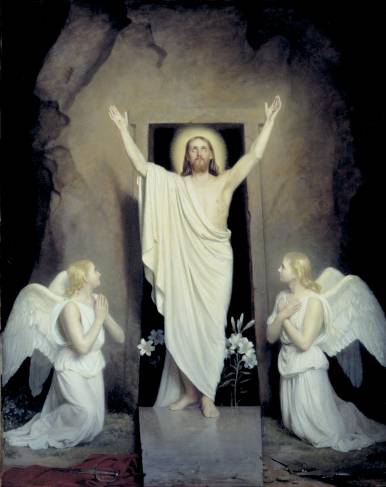
"The Resurrection"
by Carl Heinrich Bloch
And while they were at supper, Jesus took bread and blessed and broke and gave it to His disciples and said, "Take you and eat, this is my Body." And taking the chalice He gave thanks and gave it to them saying, "Drink you all of this. For this is my Blood of the New Testament which shall be shed for many unto remission of sins." (Matthew 26:26-28)St. John, who does not give us the narrative of the institution of the Eucharist, devotes a whole chapter to Christ's promise of giving His followers His own flesh to eat and His own blood to drink. What Christ emphasizes is the absolute necessity of being nourished by His Body and Blood if the supernatural life received at Baptism is to be sustained.
I tell you most solemnly, if you do not eat the flesh of the Son of Man and drink His blood, you will not have life in you. Anyone who does eat my flesh and drink my blood has eternal life and I shall raise him up on the last day. For my flesh is real food and my blood is real drink. He who eats my flesh and drinks my blood lives in me and I live in Him. As I, who am sent by the living Father, myself draw life from the Father, so whoever eats me will draw life from me. This is the bread come down from heaven; not like the bread our ancestors ate. They are dead, but anyone who eats this bread will live forever. (John 6: 53-58)Throughout the gospels and St. Paul, Christ uses words like "take," "eat," "drink," always clearly indicating that the Eucharist is to be taken into the mouth and consumed. No less, and far more, than material food and drink are necessary to sustain the natural life of the body, so Holy Communion must be received to support and nourish the supernatural life of the soul.
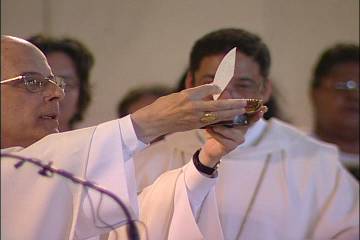 Since the earliest times, the benefits of receiving the Body and Blood of Christ were spelled out to encourage
frequent, even daily, Holy Communion.
Since the earliest times, the benefits of receiving the Body and Blood of Christ were spelled out to encourage
frequent, even daily, Holy Communion.
Thus, St. Cyril of Jerusalem (died 387) said that reception of the Eucharist makes the Christian a "Christbearer" and "one body and one blood with Him" (Catecheses, 4,3). St. John Chrysostom (died 407) speaks of a mixing of the Body of Christ with our body, "…in order to show the great love that He has for us. He mixed Himself with us, and joined His Body with us, so that we might become one like a bread connected with the body" (Homily 46,3). These and other comparisons of how Communion unites the recipient with Christ are based on Christ's own teaching, and St. Paul's statement that, "the bread which we break, is it not the partaking of the Body of the Lord? For we, being many, are one bread, all that partake of this bread." (I Corinthians 10:16-17).
So, too, the church officially teaches that "Every effect which bodily food and bodily drink produce in our corporeal life, by preserving this life, increasing this life, healing this life, and satisfying this life - is also produced by this Sacrament in the spiritual life" (Council of Florence, November 22, 1439). Thus:
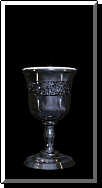
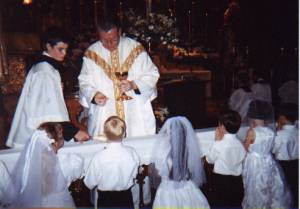
| The Discipline Regarding the Denial of Holy Communion to Those Obstinately Perservering in Manifest Grave Sin - Archbishop Raymond L. Burke "During the election campaign of 2004 in the United States of America, some Bishops found themselves under question by other Bishops regarding the application of can. 915 of the Code of Canon Law in the case of Catholic politicians who publicly, after admonition, continue to support legislation favoring procured abortion and other legislation contrary to the natural moral law, for example, legislation permitting the cloning of human life for the purpose of harvesting stem cells by the destruction of the artificially-generated human embryo, and legislation redefining marriage to include a relationship between persons of the same sex. The gravity of the sin of procured abortion and of the sins involved in the commission of other intrinsically-evil acts seemed to place the Catholic politicians among those who obstinately persevere in manifest grave sin, about whom can. 915 treats." |
|||
| The Meaning of Easter - Fr. John A. Hardon, S.J. "We live out the mystery of Christ's resurrection by our devotion to the Eucharist…because the Holy Eucharist is the Risen Christ…now on earth in our midst." |
|||
| The Eucharist as Communion Sacrament - Fr. John A. Hardon, S.J. "We will reflect on the meaning of the Holy Eucharist as a channel of grace and how Holy Communion is a means of obtaining supernatural sustenance for the divine life we received at Baptism." In addition, Fr. Hardon explains how to become an Apostle of Holy Communion. |
|||
| The Depth's of God's Love - J. Marianne Siegmund "Our Lord teaches the Apostles, His first bishops, what it means to love; this love is manifest especially in the institution of the Holy Eucharist. Man encounters the enormous love of God by frequent reception of Christ in Holy Communion…" |
|||
| Extraordinary Ministers of the Eucharist - Peter A. Kwasniewski (EWTN) A helpful article on the appropriate use of extraordinary ministers of the Eucharist, citing six important Vatican documents on the subject. |
|||
| A Case for Communion on the Tongue - David L. Vise (EWTN) This is an excellent defense of the traditional way of reaching Holy Communion. David Vise gives us the history of how the practice of Communion in the hand became the normative way of receiving Communion despite the fact that the 'Supreme Pontiff judged that the long received manner of ministering Holy Communion to the faithful should not be changed.' |
|||
| Sacrament of Communion - Archbishop Raymond L. Burke (St. Louis Review Online) The celebration of the Holy Eucharist is the highest expression of the Church’s identity as communion. Through the celebration of the Holy Eucharist, the Church best carries out her mission of maintaining and promoting 'communion with the Triune God and communion among the faithful' (no. 34). It is not surprising to us, therefore, that one of our most common ways of naming the Holy Eucharist is Holy Communion. |
|||
| The Holy Eucharist: The Mystery of Faith - Archbishop Raymond L. Burke (St. Louis Review Online) "My second reflection upon the Church’s teaching on the Holy Eucharist centers on the first chapter of Pope John Paul II encyclical letter 'Ecclesia de Eucharistia (On the Eucharist in Its Relationship with the Church),' which is titled 'The Mystery of Faith.' It is a particularly fitting reflection during the holiest days of the Church year, in which the Holy Eucharist was instituted and Christ’s Sacrifice on Calvary, which it makes present, was accomplished." |
|||
| How Many Times May the Eucharist be Received in One Day? - Fr. John
Trigilio (EWTN) |
|||
| Who Can Receive Communion? - (Catholic Answers). |
|||
| The Marian Catechist Easter Season Issue - Fr. John A. Hardon, S.J. "The Risen Savior is now on earth…really coming to us in His living humanity in Holy Communion." |
|||
| Our Lady and the Resurrection - Fr. John A. Hardon, S.J. "No less than six Doctors of the Church, including SS. Ambrose, Anselm and Albert the Great held that Our Lady was the first witness of the Resurrection." |
|||
| Brief History of Lent - Fr. John A. Hardon, S.J. Reflections on the meaning and observance of Lent. |
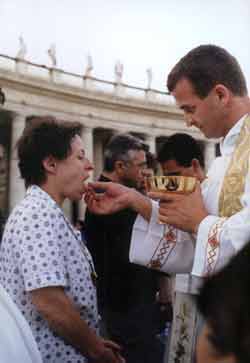 |
||
| The Catechism of the Catholic Church: Article 3, The Sacrament of the Eucharist
(alternate) |
|||
| The Blessed Sacrament is Truly Emmanuel - Part 1 - Regis Scanlon, O.F.M. (Ignatius Insight) The Church teaches that Jesus Christ has a full human nature and a full divine nature, which are united in the "Person" [12] or "hypostasis" [13] of Jesus Christ. This union, therefore, is called a "hypostatic" union. [14] The Church also teaches that our Lord Jesus Christ is "consubstantial with the Father according to divine nature, consubstantial with us according to the human nature." [15] Two good questions to help guide our thoughts in the task of understanding the being, nature, and Person of Jesus Christ would be: "Can Christ be called a human person?" and "Can Christ be called a human being?" But first, one must understand the meaning of substance and how substance differs from accident according to St. Thomas Aquinas. |
|||
| The Blessed Sacrament is Truly Emmanuel - Part 2 - Regis Scanlon, O.F.M. (Ignatius Insight) The Blessed Sacrament is Truly Emmanuel - Part 2 - Regis Scanlon, O.F.M. (Ignatius Insight) It has already been pointed out that, when the Church teaches that Jesus is "consubstantial with us according to the human nature," she means this in the sense of "essence," but not in the sense of "hypostasis" or "person." Jesus does not have a human "hypostasis" or human "person" in common with us. This is why St. Thomas says "That Christ must not be called a creature." [37] While Christ has a full human nature or essence, this essence does not include created being or a created hypostasis (person). |
|||
| EWTN: The Eucharist - has several introductory articles on the Mass and Communion. |
|||
| On the reverence we should have when we receive Holy Communion - (The Work of God). |
|||
| Desires for Holy Communion Hymn 112 - St Louis de Montfort (CIN). |
|||
| Prayer Before Receiving Holy Communion - Thomas A. Kempis (The Real Presence) |
|||
| Holy Communion - Fr. William G. Most - (EWTN) |
|||
| Church Documents on Holy Communion |
|||
The painting of The Resurrection by Carl Bloch is used with the permission of Det Nationalhistoriske Museum på Frederiksborg, Hillerød, Denmark |
First Communion photo courtesy of Rev. C. Frank Phillips, C.R. St. John Cantius, 825 N. Carpenter Street, Chicago, Illinois 60622. |
Adorers Society | PEA Manual | Essentials of Faith | Dictionary | Thesaurus | Catalog | Newsletters
|
Real Presence Eucharistic Education and Adoration Association
718 Liberty Lane Lombard, IL 60148 Phone: 815-254-4420 Contact Us Internet: www.therealpresence.org Copyright © 2000 by www.therealpresence.org All rights reserved worldwide. No part of this publication may be reproduced, stored in a retrieval system, or transmitted, in any form or by any means, electronic, mechanical, photocopying, recording or otherwise, without the prior written permission of www.therealpresence.org |